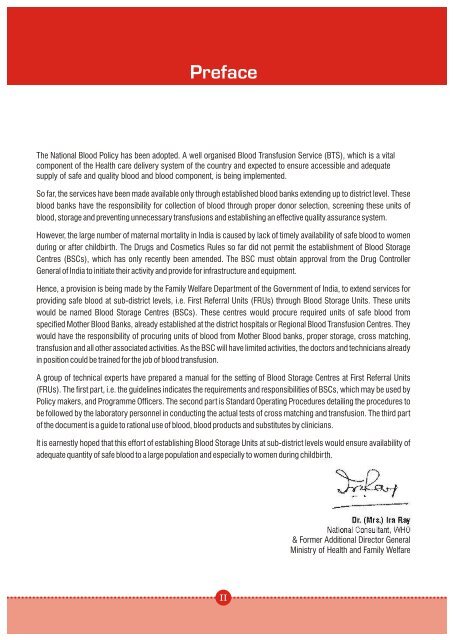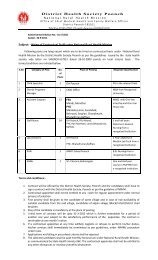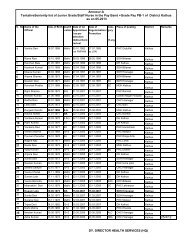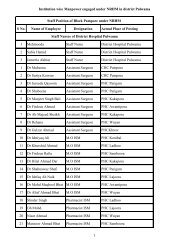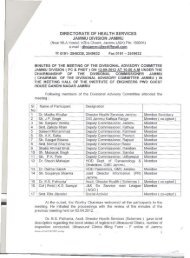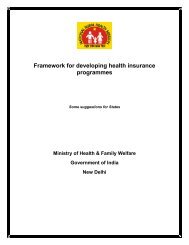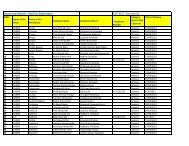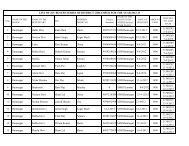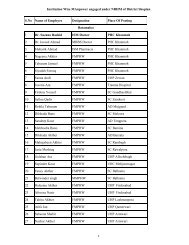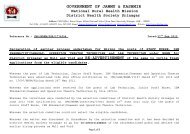Guidelines for Setting Up Blood Storage Centres - NRHM Tripura
Guidelines for Setting Up Blood Storage Centres - NRHM Tripura
Guidelines for Setting Up Blood Storage Centres - NRHM Tripura
Create successful ePaper yourself
Turn your PDF publications into a flip-book with our unique Google optimized e-Paper software.
Preface<br />
The National <strong>Blood</strong> Policy has been adopted. A well organised <strong>Blood</strong> Transfusion Service (BTS), which is a vital<br />
component of the Health care delivery system of the country and expected to ensure accessible and adequate<br />
supply of safe and quality blood and blood component, is being implemented.<br />
So far, the services have been made available only through established blood banks extending up to district level. These<br />
blood banks have the responsibility <strong>for</strong> collection of blood through proper donor selection, screening these units of<br />
blood, storage and preventing unnecessary transfusions and establishing an effective quality assurance system.<br />
However, the large number of maternal mortality in India is caused by lack of timely availability of safe blood to women<br />
during or after childbirth. The Drugs and Cosmetics Rules so far did not permit the establishment of <strong>Blood</strong> <strong>Storage</strong><br />
<strong>Centres</strong> (BSCs), which has only recently been amended. The BSC must obtain approval from the Drug Controller<br />
General of India to initiate their activity and provide <strong>for</strong> infrastructure and equipment.<br />
Hence, a provision is being made by the Family Welfare Department of the Government of India, to extend services <strong>for</strong><br />
providing safe blood at sub-district levels, i.e. First Referral Units (FRUs) through <strong>Blood</strong> <strong>Storage</strong> Units. These units<br />
would be named <strong>Blood</strong> <strong>Storage</strong> <strong>Centres</strong> (BSCs). These centres would procure required units of safe blood from<br />
specified Mother <strong>Blood</strong> Banks, already established at the district hospitals or Regional <strong>Blood</strong> Transfusion <strong>Centres</strong>. They<br />
would have the responsibility of procuring units of blood from Mother <strong>Blood</strong> banks, proper storage, cross matching,<br />
transfusion and all other associated activities. As the BSC will have limited activities, the doctors and technicians already<br />
in position could be trained <strong>for</strong> the job of blood transfusion.<br />
A group of technical experts have prepared a manual <strong>for</strong> the setting of <strong>Blood</strong> <strong>Storage</strong> <strong>Centres</strong> at First Referral Units<br />
(FRUs). The first part, i.e. the guidelines indicates the requirements and responsibilities of BSCs, which may be used by<br />
Policy makers, and Programme Officers. The second part is Standard Operating Procedures detailing the procedures to<br />
be followed by the laboratory personnel in conducting the actual tests of cross matching and transfusion. The third part<br />
of the document is a guide to rational use of blood, blood products and substitutes by clinicians.<br />
It is earnestly hoped that this ef<strong>for</strong>t of establishing <strong>Blood</strong> <strong>Storage</strong> Units at sub-district levels would ensure availability of<br />
adequate quantity of safe blood to a large population and especially to women during childbirth.<br />
Dr. (Mrs.) Ira Ray<br />
National Consultant, WHO<br />
& Former Additional Director General<br />
Ministry of Health and Family Welfare<br />
II


